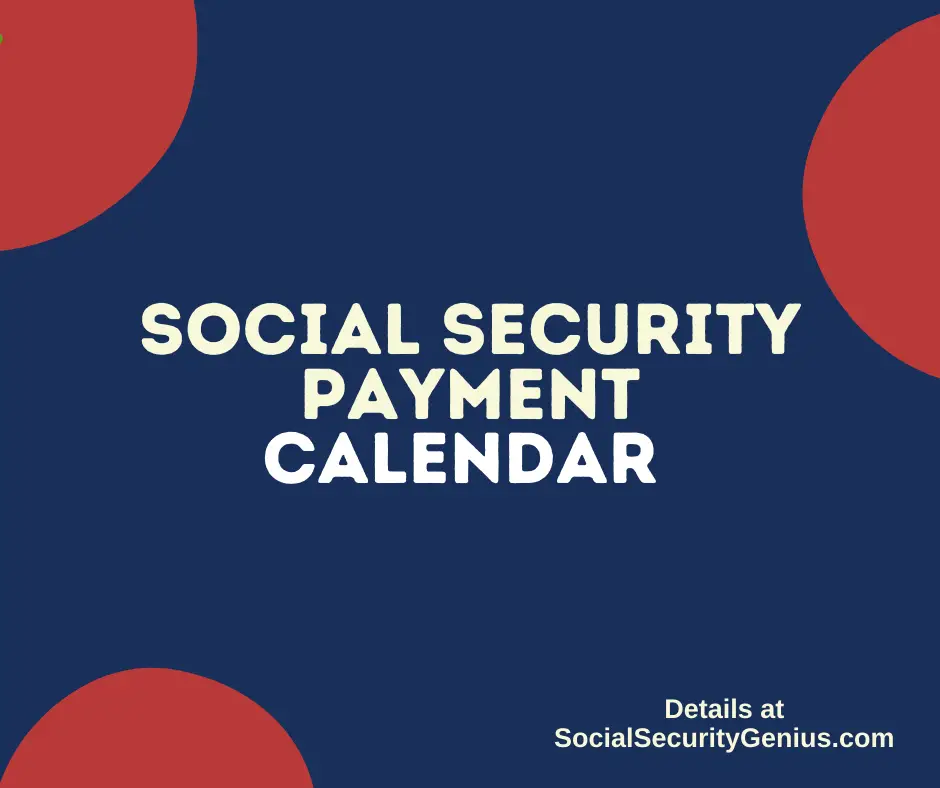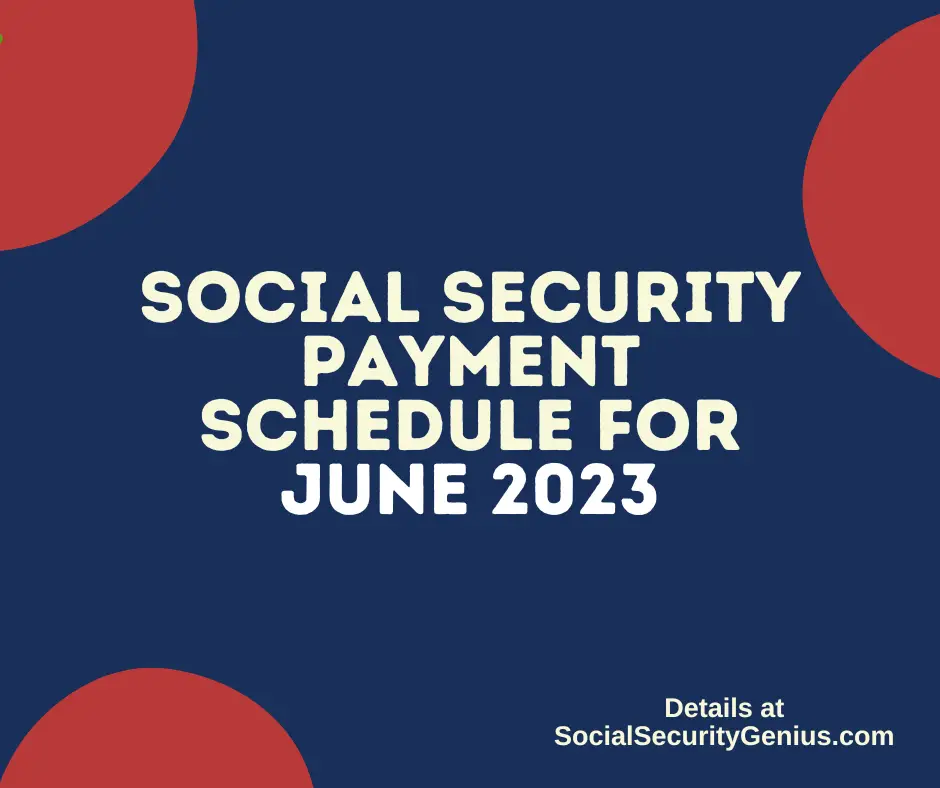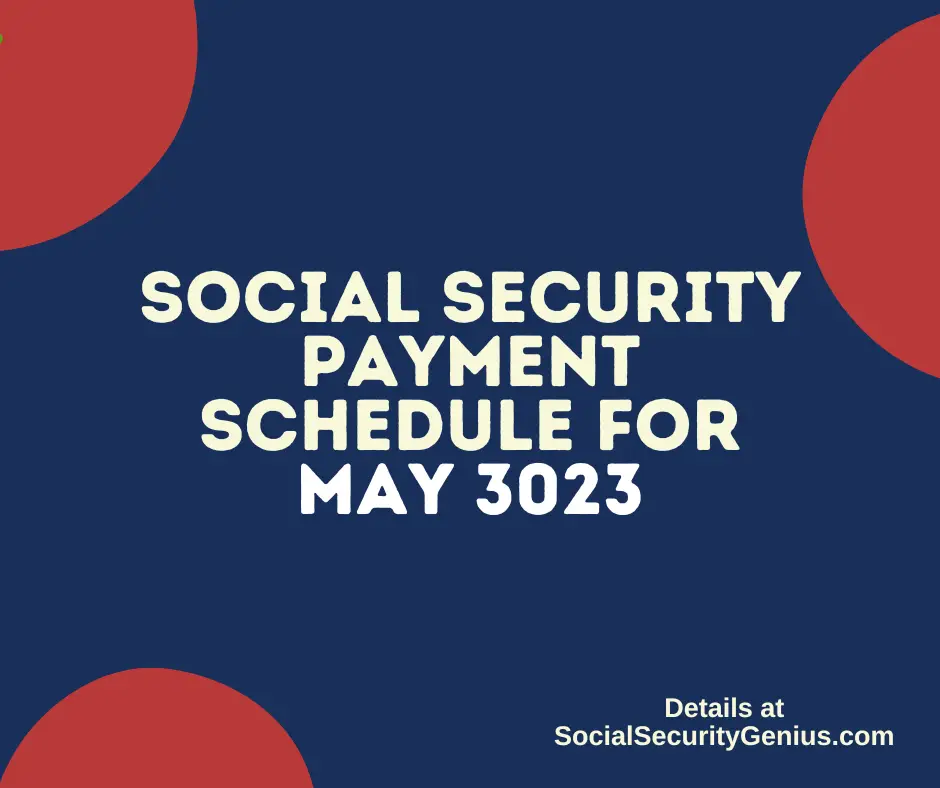If you are currently on Social Security retirement benefits, Supplemental Security Income (SSI), or Social Security Disability Insurance (SSDI) and would like to when you will receive your Social Security check this month, or when direct deposits will be made, or whether payments will come early this month, we can help. This post will cover Social Security Payment Calendar by month, with specific dates on when payments will be made each month.
Also, we will provide a printable Social Security payment schedule for your convenience.
In addition, we will answer some of the most commonly asked questions about Social Security payments.
Lastly, we will cover 3 of the top Social Security Questions we get from our readers.
Here is the Social Security Payment Calendar.

Table of Contents
- No More Paper Checks for Social Security Benefits
- Current Social Security Payment Calendar
- What To Do If You Don’t Receive Your Benefits
- Can I change the date I receive my Benefits?
- Can I split my Social Security benefit between two bank accounts?
- Social Security Questions and Answers
No More Paper Checks for Social Security Benefits
Since 1935, the Social Security Administration (SSA) has mailed paper checks to Social Security beneficiaries.
However, that ended in May 2011.
That’s because Congress passed a law that required all recipients of payments from federal benefits programs to sign up for electronic payments.
Since then, all new recipients of Social Security and Supplemental Security Income disability have been required to sign up for electronic payments.
In addition, existing recipients of Social Security and SSI had to comply with the new requirements by March 1, 2013.
As a result, the SSA no longer mail paper checks for Social Security benefits, including disability payments.
Current Social Security Payment Calendar
If you receive Social Security and Social Security Disability Insurance (SS and SSDI):
For the most part, the date on which you receive your payment depends on whether you started receiving social security benefits before or after May 1997.
If you started receiving benefits after May 1997, then your benefit payment is made on one Wednesday of the month, depending on your birth date.
- First, If your birthday falls on the 1st to the 10th of your birth month, you’ll receive your payments on the second Wednesday of each month.
- If your birthday falls on the 11th to the 20th of your birth month, you’ll receive your payments on the third Wednesday of each month.
- If your birthday falls on the 21st to the 31st of your birth month, you’ll receive your payments on the fourth Wednesday of each month.
Note that if you are a spouse receiving survivor’s benefits, the payment date will be based on the birth date of the deceased individual upon whose work record the benefit payments are being made.
If you receive Supplemental Security Income (SSI), you will receive your payments on the 1st of each month.
The exception is when the 1st falls on a weekend or holiday.
If the first falls on a holiday, then you will receive your payment the business day before.
However, if the first falls on a weekend, you’ll receive your payment on the preceding Friday.
Social Security Payment Calendar by Year:
2023 – Printable Social Security Calendar
2022 – Printable Social Security Calendar
2021 – Printable Social Security Calendar
Social Security Payment Calendar by Monthly
Here are the monthly Social Security Payment Calendars by year.
Current Year – 2023
January
February
March
April
May
June
July
2022
January
February
March
July
August
September
October
November
December
2021
January
February
March
April
May
June
July
August
September
October
November
December
What To Do If You Don’t Receive Your Benefits
If you receive your Social Security check by direct deposit or via a prepaid debit card like Direct Express, it should arrive on its due date, or the day before if the due date is a holiday.
If you do not receive your benefit payment by the date expected, allow three days to pass after your payment date before you contact Social Security.
You can contact Social Security at 1-800-772-1213.
Can I change the date I receive my Benefits?
Unfortunately, you cannot change the date you receive your Social Security benefits.
Can I split my Social Security benefit between two bank accounts?
Currently, the Social Security system only allows direct deposit only to a single account, at a financial institution (e.g. checking account, savings account, or prepaid card account).
However, you may preauthorize your financial institution to transfer funds into your other bank accounts.
Top 3 Social Security Questions from our Readers
Here are the 3 most frequently asked Social Security Benefits from our readers:
Can I work while collecting Social Security Benefits?
The short answer is Yes!
However, whether the income you make will affect how much in Social Security benefits you receive depends on when you start receiving benefits.
If you start receiving Social Security benefits before you reach full retirement age (FRA), then your income from working might reduce the amount of your benefit.
When you start to receive Social Security at your FRA, you qualify to collect 100 percent of the maximum benefit allowed from your earnings history.
Until then, Social Security doesn’t consider you fully “retired” if you make more than a certain amount from work.
As a result, they will deduct a portion of your benefits if your earnings exceed that limit.
However, once you reach FRA, there is no cap on how much you can earn and still receive your full Social Security benefit.
The income earnings limits are adjusted annually.
In 2021, for every $2 earned over $18,960, you lose $1 in Social Security Benefits.
For example, if you have a part-time job that pays $25,000 a year, it means you are making $6,040 over the limit ($25,000-$18,960).
Therefore, your Social Security Benefits will be reduced by $3,020, which is half of the $6,040.
Do Seniors on Social Security Qualify for Food Stamps?
The short answer is Yes!
For many seniors, their Social Security benefits represent a significant source of their monthly income.
However, that is not always enough to meet their needs, including buying enough food for the month.
According to the Social Security Administration, these are the average Social Security benefits in 2021:
- $1,543 per month for retired workers.
- $801 per month for spouses of retired workers.
- $1,455 for older widows or widowers receiving survivor benefits.
If the average retiree is getting $1,543 a month in social security benefits, it means they are they will have to live on $18,516 per year.
If there is no income from other sources, making ends meet becomes a challenge for some seniors.
According to NCOA, In 2016, nearly 8.6 million older Americans faced the threat of hunger, representing 13.6% of adults aged 60+ in the U.S.
Food Stamps for Seniors
Seniors may qualify for food stamps (otherwise known as SNAP) to help buy food.
However, 3 out of 5 seniors who qualify for food stamps don’t apply.
In many states, you can apply for food stamps at the local County Department of Social or Family Services.
You can apply in apply in-person, by phone, or online.
Whether you can receive food assistance depends upon:
- the number of people in your household,
- your income, and
- your resources (such as cash, savings, and checking accounts).
Eligibility for SNAP is based on financial need.
However, there is a special income rule that applies to elderly or disabled persons.
Households with older adults (age 60 or older) and people with disabilities may have up to $3,000 in cash assets to qualify.
In addition, their monthly income must be below the federal poverty guideline, after taking all allowable deductions.
Finally, unlike other households, households with Seniors or the disabled are not required to meet a cap on gross income.
To apply for food stamps, contact your local department of social services or department of families.
Click here for more information on applying for food stamps.
How Does Social Security Spousal Benefits Work?
When it comes to Social Security retirement benefits, being married has its advantages.
Depending on your situation, taking spousal benefits may help you maximize how much in benefits you and your spouse receive.
However, how much you’ll receive depends on a number of factors, including:
- Your age
- The amount of your spouse’s benefit
- Whether you have other retirement benefits available to you
If you have not worked or do not have enough Social Security credits to qualify for your own Social Security benefits, you may be able to receive spousal benefits.
You qualify for spousal benefits if:
- Your spouse is already collecting retirement benefits.
- You have been married for at least a year.
- You are at least 62 (unless you are caring for a child who is under 16 or disabled, in which case the age rule does not apply).
Also, if you are divorced and your marriage lasted at least 10 years, you may be able to get benefits on your former spouse’s record.
Finally, If your spouse or ex-spouse is deceased, certain family members may be able to receive monthly benefits, including:
- A widow or widower age 60 or older (age 50 or older if disabled);
- A surviving divorced spouse, under certain circumstances;
- A widow or widower at any age who is caring for the deceased’s child who is under age 16 or disabled and receiving benefits on their record;
Social Security Payment Calendar Summary
We hope you found this article on Social Security Payment Calendar helpful.
Questions?
If you still have questions, you should leave a comment below.
However, what may be an even greater help is to join our FREE Facebook members group about Making Sense of Social Security Benefits.
It’s a very active group with some really smart people who love to answer any questions you may have about Social Security Benefits.
Also, from time to time, our team of editors drop in to contribute and answer questions.
Finally, you may like these popular articles, including How to Change Your Address with Social Security, the Top 5 Changes to Social Security in 2021, and 2021 Social Security Payment Calendar.


